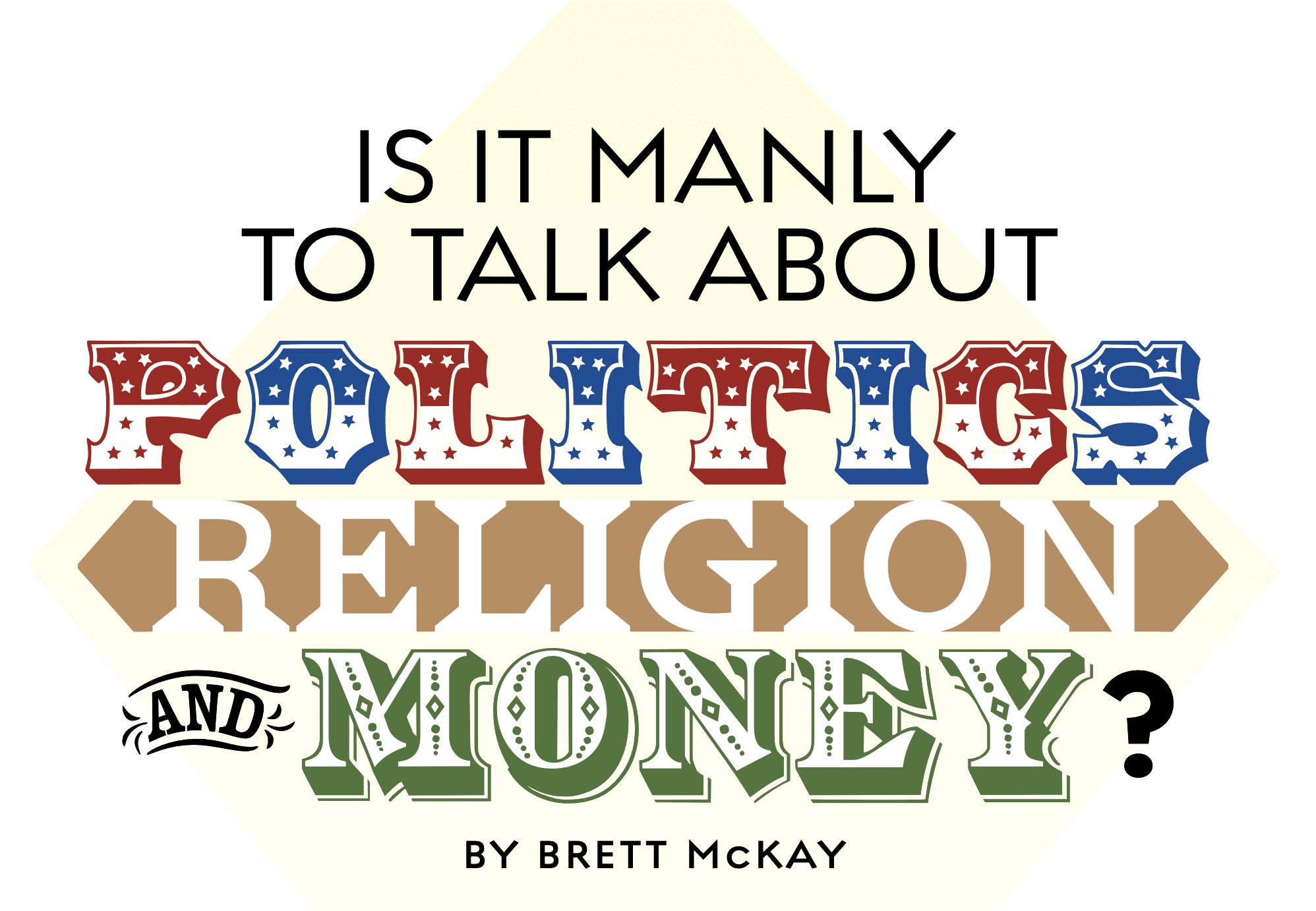
Is It Manly to Talk About Politics, Religion, and Money?
Politics, religion, and money: An expert on “manliness” explains how to discuss these tricky topics.
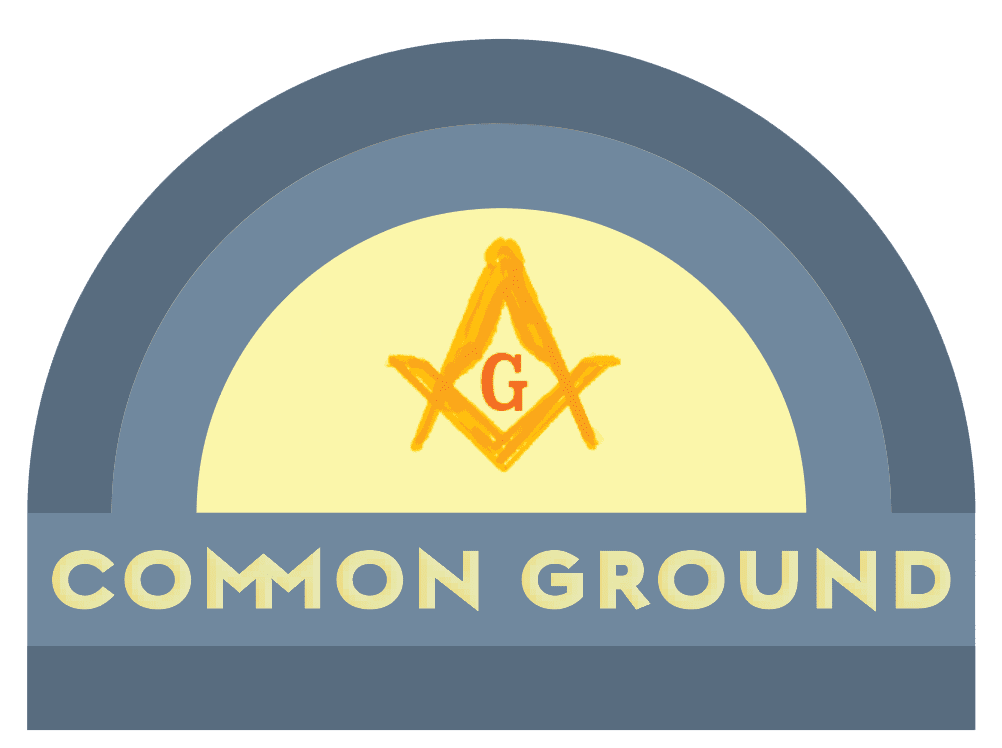
By Ian A. Stewart
In September 2019, as the San Francisco Recreation and Parks Department officially unveiled the new name for what’s now Presidio Wall Playground, the event went off with little fanfare. A modest delegation of representatives from community groups were on hand as a new sign was revealed by workers in orange reflective vests. They applauded politely and were soon on their way. No one made any remarks. The ceremony took less than 10 minutes. A century earlier, when the park opened in honor of 12-term congressman Julius Kahn, it was planned as a major event, with bands, children’s games, and all kinds of festivities. Perhaps ominously, that grand opening was rained out.
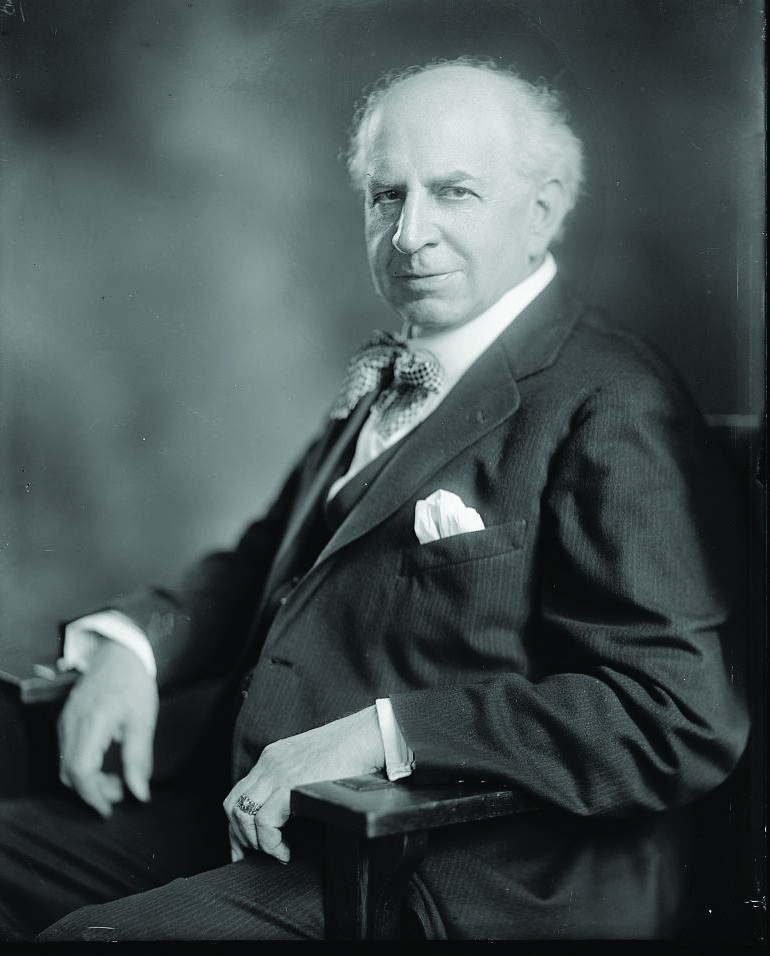
Nearly 100 years later, the park was again the focus of the city’s attention, swept up in a larger debate about the ways in which cities honor certain historical figures— especially those whose legacies are being rethought “as part of a nationwide call to stop glorifying slave traders, antisemites, racists, and imperialists,” according to the San Francisco Chronicle. That effort included Congressman Kahn, the park’s namesake, who was the city’s first Jewish representative in Washington in 1899, but who was also responsible for helping pass an extension of the Chinese Expulsion Act, which prevented nearly all Chinese immigrants from gaining citizenship and many basic rights.
In 2018, a resolution was brought to the city’s board of supervisors to strip Kahn’s name from the park. Then-supervisor Norman Yee said, “Julius Kahn’s anti-Asian policies during the early 1900s did not espouse the values that San Francisco stands for today.”
Julius “Sandy” Kahn III, a member of Oakland Durant Rockridge № 188 and the grandson of Congressman Kahn, disagrees vehemently with Yee. For many people, the movement to grapple with the history of racism in America has presented some tricky dilemmas and emotionally thorny issues, as once-revered figures have come under new scrutiny. Especially for Masons, this has led to a conundrum. For 250 years, the fraternity has pointed with pride to its association with the Founding Fathers and other civic leaders like Kahn (a member of St. Cecile № 568 in New York)—in many cases, the very figures being wrenched from their historic pedestals. For Kahn, it was personal, too.
But rather than engage in what appeared to be an unwinnable fight, Kahn, who lives at the Acacia Creek Retirement Community in Union City, chose another tack. He remains proud of his connection to one of San Francisco’s most influential politicians, not to mention one of the most important Jewish families on the West Coast. But he is more apt to use his grandfather’s memory as a launching point for a conversation about early San Francisco history than for an impassioned defense of his grandfather’s character.
That, says the younger Kahn, who worked as an estate-planning attorney for nearly 60 years in the Bay Area, is also by design—and a reflection of his half-century membership in the fraternity. Rather than remain at loggerheads over an emotionally charged issue, Masonry compels its members to find shared values around which to work. In doing so, Kahn invokes one of the most profound lessons of Masonry—and something Kahn believes is missing from contemporary political argument. That is summarized in the Masonic degrees, in which the tool of the compass is said to represent the ability to “circumscribe our desires and keep our passions within due bounds.” In doing so, one demonstrates restraint and control, the basis for morality and wisdom.
And so, rather than argue on behalf of the man who introduced the Selective Service Act, secured the 1915 Panama-Pacific International Expo of San Francisco, and served as ranking chairman of the powerful Military Affairs Committee, Kahn pulls out a fading leather binder full of family photos and starts to talk about someone else entirely.
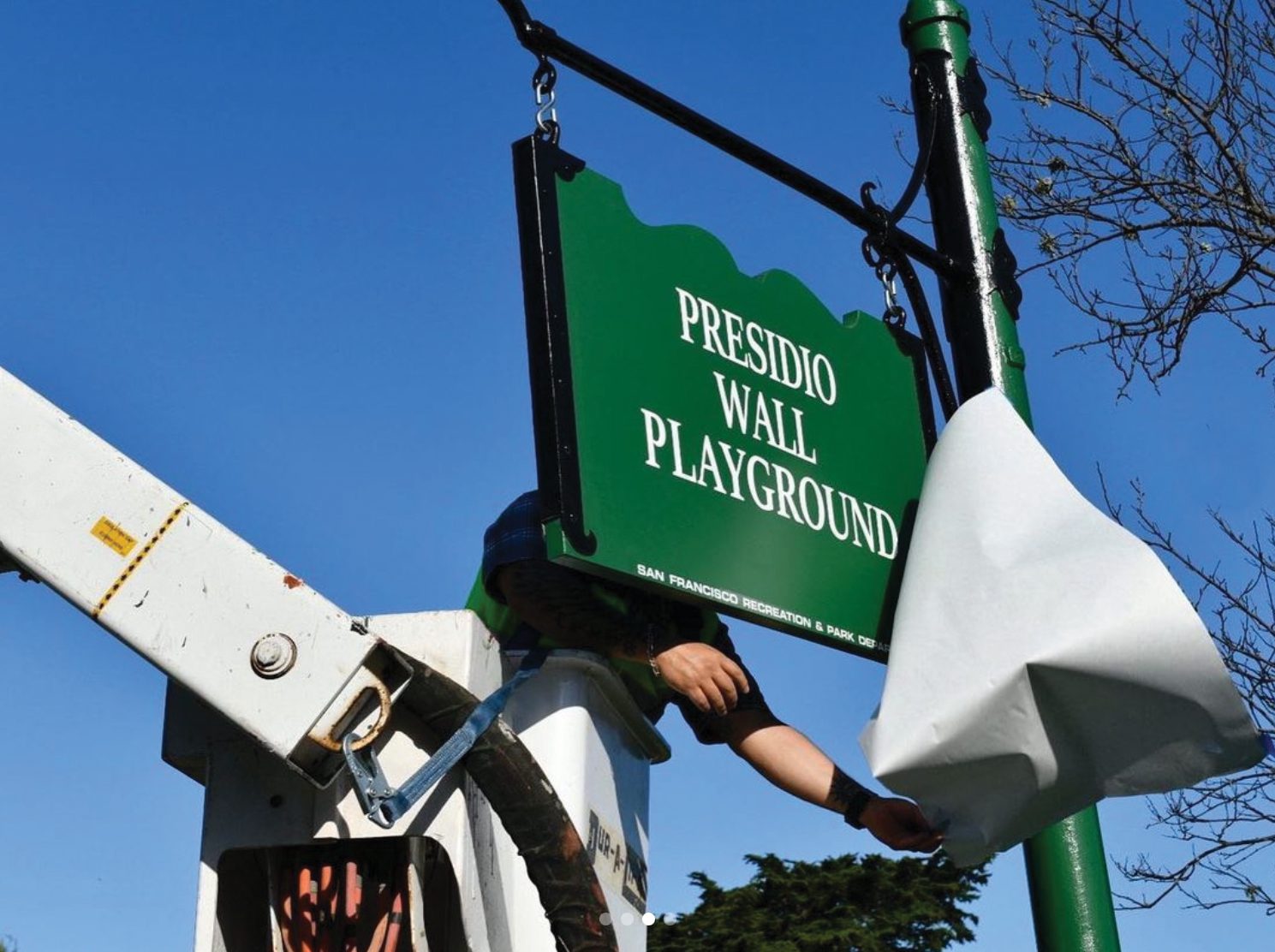
From Kahn’s perspective, the good to come out of the debate over his grandfather’s memory is that it’s afforded him an opportunity to shine a spotlight on another member of his family who has been largely overlooked. In fact, it isn’t Julius Kahn that looms largest in the family history at all. It’s his wife. And in many ways, Florence Prag Kahn’s legacy not only rivals that of her better-known husband but it eclipses it.
While largely unknown today, Florence Prag Kahn stands as one of the most important and influential women in local history. Upon her husband’s death in 1924, Prag Kahn was tapped in a special election to finish his term in office, making her the first Jewish woman in Congress. However, Prag Kahn did more than just fulfill a so-called widow’s term. A former teacher whose own mother had served on the San Francisco Board of Education, and one of only nine women in her graduating class at the University of California in Berkeley, she proved to be a natural for the job. Not only did she fulfill Kahn’s term, but she was elected five more times after that, in the process becoming one of the most powerful women in the country.
“She was such a compelling figure,” Sandy Kahn says of his grandmother, whom he knew well as a child. “For as important as she was, at home she was sweet and loving, just a real family-oriented person.”
Sandy Kahn, a longtime Bay Area lawyer, is intent on keeping his family legacy alive—especially that of his grandmother, Florence Prag Kahn.
She was also her own woman. Though she advocated for expanded military budgets and pushed a defense position in Congress, as her husband had, she carved her own path on many issues. Like her husband, she was hawkish on military issues—she was even named to the same Military Affairs Committee Kahn had once chaired. But she also pushed many progressive social reforms, including campaigning to repeal the Volstead Act prohibiting the sale of alcohol, opposing federal censorship laws, and fighting against “blue laws” forcing certain businesses to close on Sundays. “Running through all her legislation is a thread of concern for women’s rights and interests,” writes Alice Wentzell, who penned a biography of her.
While never recognized as a leading suffragette, Florence Kahn through her actions and words stood as a kind of early feminist leader, Wentzell says, and in later years she encouraged women not only to vote but to elect women to political office. Among her chief accomplishments were protecting the Mare Island naval shipyard from closure, securing the funding for the Alameda Naval Base and Hamilton Air Force Base, and helping bring the Golden Gate International Expo of 1939 to Treasure Island. She also carried the legislation that led to the construction of the Bay Bridge and the Golden Gate Bridge. In his history of Jewish San Francisco, Cosmopolitans, historian Fred Rosenbaum writes, “Though she represented a relatively conservative district in the northern part of the city, she was, after all, a San Francisco politician, pro-union and broadminded on social issues.”
More than that, Florence Kahn was a revered figure in Washington—a quick wit who became an “overnight hit on the congressional stage,” according to Hope Chamberlin in A Minority of Members. Her success, on the heels of her husband’s, “gave many Bay Area Jews a relative sense of security that lasted well into the 1930s, even while other American Jews were feeling more vulnerable than ever,” Rosenbaum writes.
In 1929, Prag Kahn was appointed to the powerful Congressional Appropriations Committee, making her the first woman named to that body. It was there that she helped increase funding for the nascent Federal Bureau of Investigations, which led J. Edgar Hoover to lovingly refer to her as the “mother of the FBI.” Upon her death in 1948, Hoover served as a pallbearer at her funeral.
Sandy Kahn never met his grandfather, but he remembers Florence well. Despite her elevated standing—Sandy recalls seeing some of the biggest names in politics, from Hoover to Governor Earl Warren (the grand master of Masons in California in 1935), drop by her apartment on Nob Hill in her later years—he says she remained down-to-earth and matronly. “It wasn’t until much later on that I became aware of how important the Kahn family was,” he says.
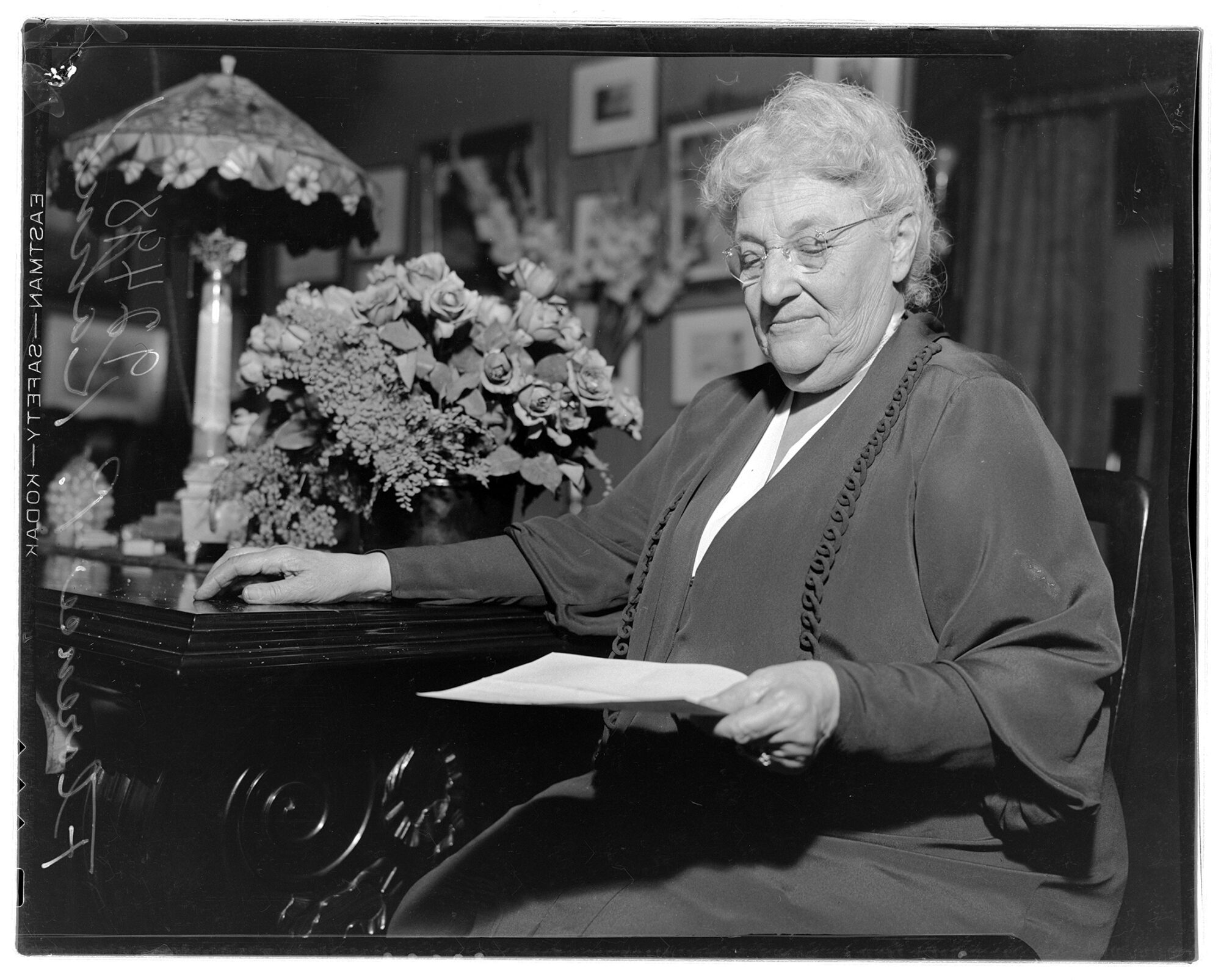
Sandy Kahn had hoped that in the wake of the renaming debate at Julius Kahn Playground, city leaders might use the opportunity to recognize his grandmother. In her, they had an influential San Francisco leader; one of the first elected women in Washington (and perhaps the first to wield significant power); and the first Jewish woman to serve in Congress. She also offered a link to the influential Kahn family and to a golden era of Jewish history in San Francisco—without the same baggage that attended her husband. Rosenbaum points out that Prag Kahn championed legislation to provide citizenship to immigrant wives of Chinese-born U.S. citizens, and birthright citizenship for the children of Chinese and Japanese families living here. “Her attitude toward the Indigenous and Chinese was very progressive for her time,” Rosenbaum says.
Still, for all that, she is hardly a household name. Despite her immense popularity during her life, she “has been largely forgotten by the press, historians, and even the people,” Wentzell writes. None of the physical testaments to her work—the Bay Bridge, Moffett Airfield, the Alameda Naval Base—acknowledge her contributions. Her name does not appear on any parks, buildings, streets, or public monuments. “She deserves more attention than she’s gotten,” Rosenbaum says. “I’m not sure why she hasn’t gotten it. She’s worth much more.”
So, while her name was floated for the renamed playground, in the end it wasn’t to be.
A group from the Pacific Heights Residents Association considered a dozen suggested names for the park, which it winnowed down to three. Only one person’s name made the final cut, alongside West Pacific Playground and Presidio Wall Playground. That was Rhoda Goldman Playground, for the benefactor who funded the playground’s clubhouse. The group decided against even that.
“This is a neighborhood that is devoted to families and children, and it became clear to me, watching what was eliminated and what rose to the top, that because this is a playground for children, it should not get itself involved in large controversies,” Charlie Ferguson, the head of the neighborhood group, told the Richmond Review. “A playground should remain mainly a playground, without controversy associated. And for that reason the names that may sound rather blah rose to the top.”
For Sandy Kahn, it was a missed opportunity—but not the final word. That, he says, will belong to him and his children, ideally delivered while thumbing through the well-worn family scrapbook as they describe the good and the bad, the public statements and the private moments, that made up his grandparents’ lives. That legacy, he says, lives on.
PHOTOGRAPHY/ILLUSTRATIONS COURTESY OF:
Top: Martin Klimek
Library of Congress
SFRP via Instagram
Bancroft Library, UC Berkeley

Politics, religion, and money: An expert on “manliness” explains how to discuss these tricky topics.
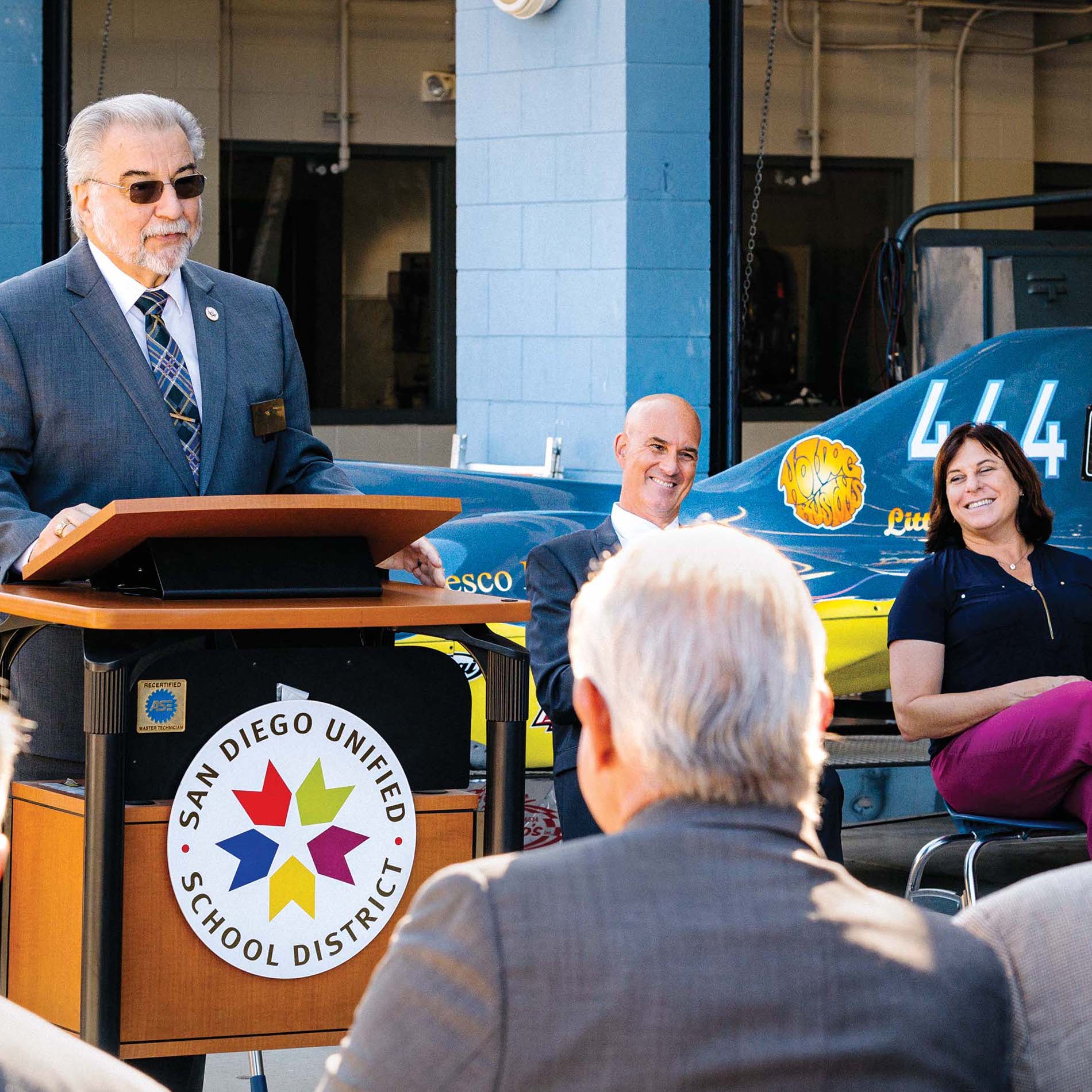
A new gift from the Masons of California is helping San Diego kids go under the hood through high-tech education in growing fields.
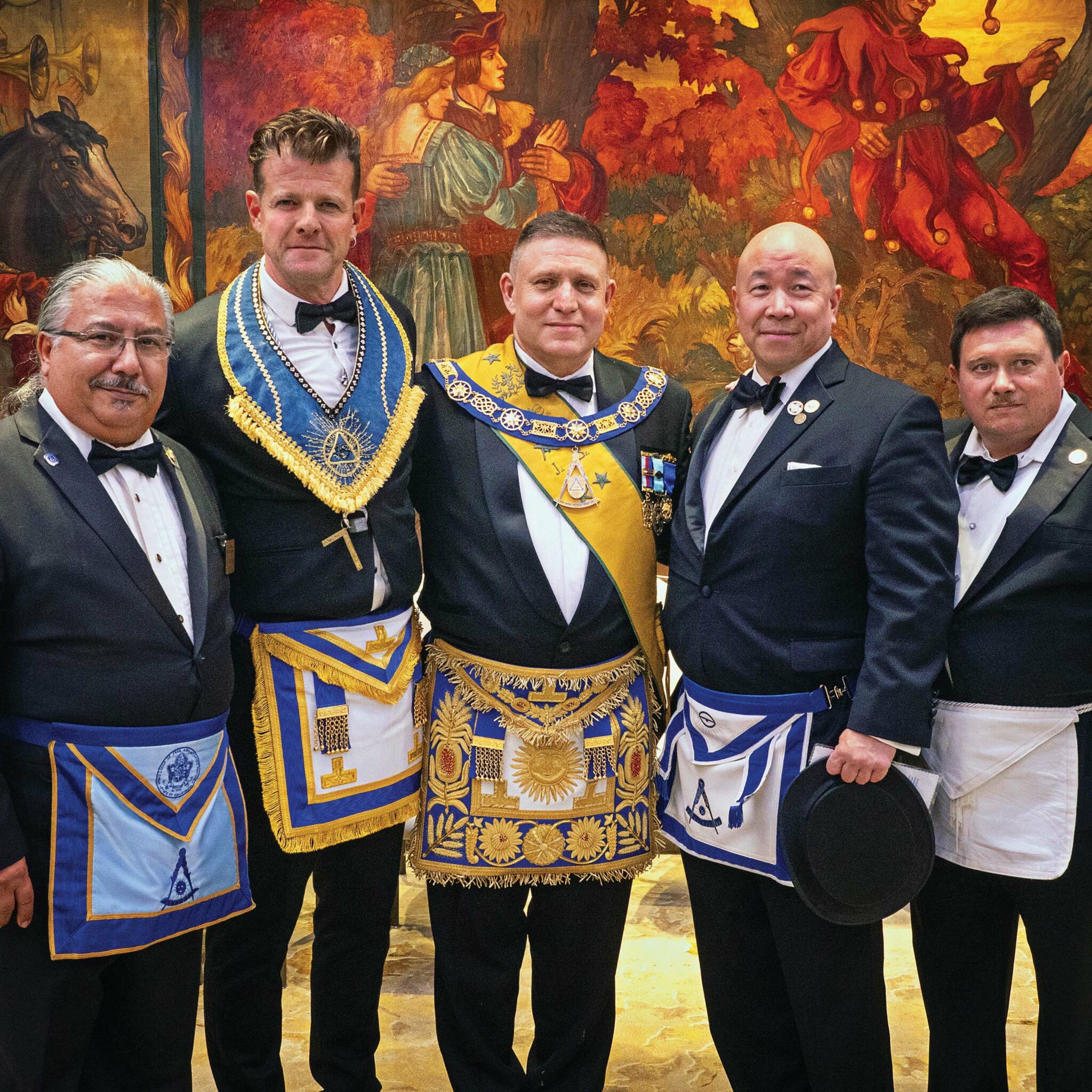
A Masonic trip to Hungary forges connections across borders.